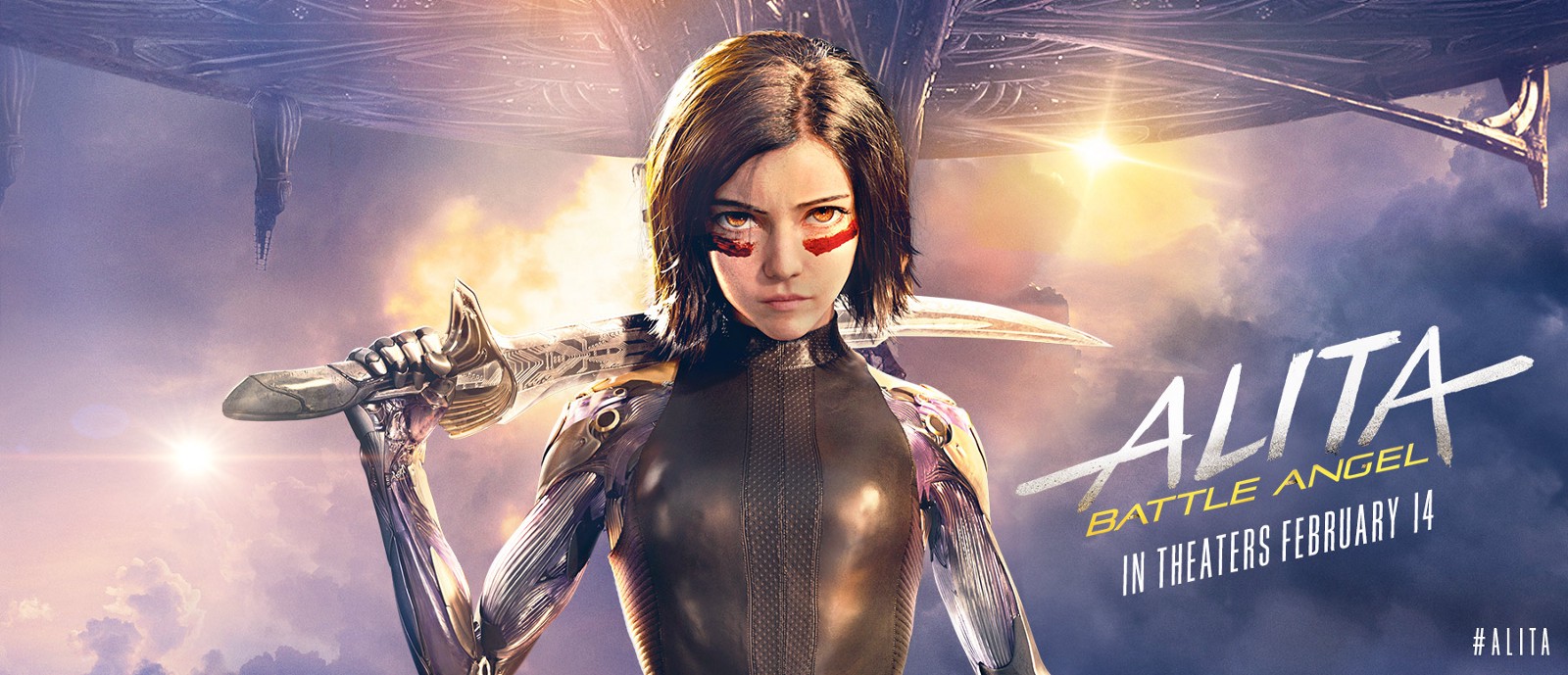 ★★★★
★★★★
“Mechanical Pixie Dream Girl.”
 Depending on your definition, this is perhaps the most expensive action-heroine film of all time, estimated at more than $200 million before tax incentives. Given the fate of live-action adaptations of manga in the West, most recently Ghost in the Shell, this was always going to be a risky investment, even with the name of James Cameron, the most successful movie-maker in history, attached as a producer. At one point, people were predicting a bomb of Mortal Engines size. While Alita seems to have escaped that fate, it’s going to have to do very well in both China and Japan, the two remaining territories, if it’s to turn any kind of profit, never mind start a franchise.
Depending on your definition, this is perhaps the most expensive action-heroine film of all time, estimated at more than $200 million before tax incentives. Given the fate of live-action adaptations of manga in the West, most recently Ghost in the Shell, this was always going to be a risky investment, even with the name of James Cameron, the most successful movie-maker in history, attached as a producer. At one point, people were predicting a bomb of Mortal Engines size. While Alita seems to have escaped that fate, it’s going to have to do very well in both China and Japan, the two remaining territories, if it’s to turn any kind of profit, never mind start a franchise.
 That’s a shame, because this is a solid, well-made piece of science-fiction, which does a particularly good job of creating a massive, epic world on the cinema screen. Rodriguez has been squeezing every penny out of his budgets since El Mariachi, and while there may not be much apparent overlap between Alita with Shark Boy and Lava Girl, the latter franchise was excellent training for RR in meshing computer graphics with actors. Sin City also laid similar groundwork, and helped set up the director with the chance to go big or go home. And there’s no doubt: Rodriguez went big. This was my first cinema trip of 2019, and was fully justified.
That’s a shame, because this is a solid, well-made piece of science-fiction, which does a particularly good job of creating a massive, epic world on the cinema screen. Rodriguez has been squeezing every penny out of his budgets since El Mariachi, and while there may not be much apparent overlap between Alita with Shark Boy and Lava Girl, the latter franchise was excellent training for RR in meshing computer graphics with actors. Sin City also laid similar groundwork, and helped set up the director with the chance to go big or go home. And there’s no doubt: Rodriguez went big. This was my first cinema trip of 2019, and was fully justified.
Having recently read the original manga, I was struck by how faithful the film was to most aspects. Right from the get-go, with Doc Ido (Waltz) finding the shattered remains of Alita (Salazar) on the scrap-heap below Zalem, there were shots which could have been story-boarded by the graphic novel. [Again, something Rodriguez also did in Sin City] Ido, in particular, looks exactly like I imagined him, and the same goes for Vector (Mahershala Ali), the shady power behind the scenes in Iron City, as well as Zapan and the rest of the bounty hunters.
The story is generally quite faithful, too. After her rescue, Alita tries to recover her past memories, becomes a bounty-hunter, falls in love with human boy Hugo (Johnson), takes up the brutal sport of Motorball, and experiences personal tragedy. However, the order of the events is shifted: in the manga, the tragedy is what spurs her entry into the Motorball arena. The film also adds Ido’s ex-wife, Chiren (Connolly), a character who was not in the comics, though does appear in the OVA. Here, they had a disabled daughter named Alita, who was killed by one of Ido’s Motorball goons. It’s a rather clunky subplot, which doesn’t add particularly much, beyond explaining from where Alita v2.0’s body came.
There has been much debate over Alita’s eyes, which have been CGI-increased in size to an extent rarely if ever seen in a live-action film. Of course, she’s a cyborg, so whatever. However, it is still something of a distraction, even though it appears they’ve been toned-down in size from early trailers, where it appeared her eyeballs would have occupied most of her brain’s frontal lobe. The eyes are one of the hardest things to get right with computer graphics, and when it isn’t, the results can be horrible, as with the resurrected Peter Cushing in Rogue One. This is better, and at some moments does enhance things, basically acting as a megaphone for Alita’s feelings. However, it also plays into the film’s main weakness: an apparent lack of genuine emotion. I’ll circle back to that a bit later.
As a spectacle, this is grand, offering sweeping vistas of a future world, densely populated with people, things and those in between. As an action movie, it works pretty well too. The two best set-pieces are the bar-brawl where newly-registered bounty hunter Alita proves her worth to her colleagues, and the Motorball game, where everyone else taking part cares only about killing Alita. There’s a palpable sense of progression in her skills over the course of the film. Initially, she’s clearly raw and unfocused, but after she is paired with her “berserker” body… [Inevitably, it has been the subject of PC whining, about it looking ‘too feminine’] Hoo-boy. By the end, she’s a weapon on mass destruction, regardless of the opponent’s size.
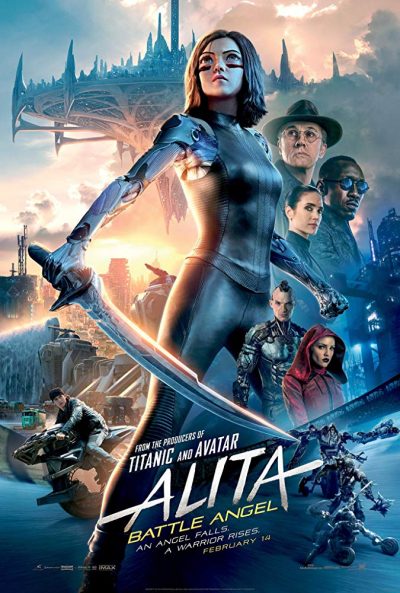 And speaking of the end, one frequently-heard bit of criticism is that the ending is too “open,” apparently fishing for a sequel. I can’t say I felt that way at all. There’s certainly scope for more movies, apparently involving Alita going after the mysterious Nova. Yet the main thread of the film, involving Alita and Hugo, is definitively wrapped up. In comparison, say, to Marvel films, which almost inevitably have an in- or post-credit sequence blatantly signposting the next film, this felt conclusive. While there is perhaps need for a greater sense of escalation, or a bigger climax (that Motorball battle is trivial in its consequences), I’m largely baffled by complaints about the “lack of a genuine ending.”
And speaking of the end, one frequently-heard bit of criticism is that the ending is too “open,” apparently fishing for a sequel. I can’t say I felt that way at all. There’s certainly scope for more movies, apparently involving Alita going after the mysterious Nova. Yet the main thread of the film, involving Alita and Hugo, is definitively wrapped up. In comparison, say, to Marvel films, which almost inevitably have an in- or post-credit sequence blatantly signposting the next film, this felt conclusive. While there is perhaps need for a greater sense of escalation, or a bigger climax (that Motorball battle is trivial in its consequences), I’m largely baffled by complaints about the “lack of a genuine ending.”
As mentioned above, a more significant issue is that I hardly “felt” anything for any of the characters. Ido – stuck between paternal instincts of protection and a desire to allow Alita self-determination – perhaps came the closest. The relationship between Alita and Hugo is supposed to provide the film’s emotional engine. But between the former’s CGI make-up and the latter’s generic blandness, it doesn’t make much of a dent. There’s a scene where she literally tears out her heart and gives it to him: everyone, including the film itself, seems faintly embarrassed by the whole incident. Worse still – minor spoiler – the movie even goes so far as to kill a dog, without generating more than a blip of impact. Somewhere, John Wick shakes his head, sadly.
I was initially concerned about the PG-13 rating – not least because the first trailer before the film was for UglyDolls [an animated movie “about acceptance, diversity, joy and friendship” according to its site]. I needn’t have been: this is more From Dusk Till Dawn Robert Rodriguez than the Spy Kids version, with a gleeful approach to the semi-mechanized carnage. For I think it helps on the censorship front, that most of the carnage in inflicted on cyborgs, who are largely able to take a licking and keep on ticking. The manga was heavily into black market spine-ripping; here, it’s mostly limbs, which is slightly more kid-friendly, I guess.
In the end, this is just about everything for which I could have hoped. While I don’t necessarily agree with all of the artistic choices, the positives greatly outweigh the weaknesses. Although this is a low bar (hello, Speed Racer), it’s certainly the best manga/anime adaptation to come out of Hollywood. It’s a world I’d love to see explored further: whether Rodriguez and crew get the chance to do so or not, will remain in doubt until the final box-office figures arrive. Fingers crossed.
Dir: Robert Rodriguez
Star: Rosa Salazar, Christoph Waltz, Keean Johnson, Jennifer Connelly
 I mention the above for two reasons. Firstly, because Chris wondered why the film was called “At One”. Secondly, because when it finished, I turned to her and said those four little words which mean so much: “I can only apologize…” Yes, to use it in a sentence, I’ll be atoning for picking to watch this low-rent “Die Hard in a church” offering, for some time to come. [Though the following night, I had to sit through her choice of Justice League: paid back in full, I’d say…] There were a couple of aspects here that weren’t terrible; unfortunately, the overall execution was painfully close to… well, god awful seems the appropriate term here.
I mention the above for two reasons. Firstly, because Chris wondered why the film was called “At One”. Secondly, because when it finished, I turned to her and said those four little words which mean so much: “I can only apologize…” Yes, to use it in a sentence, I’ll be atoning for picking to watch this low-rent “Die Hard in a church” offering, for some time to come. [Though the following night, I had to sit through her choice of Justice League: paid back in full, I’d say…] There were a couple of aspects here that weren’t terrible; unfortunately, the overall execution was painfully close to… well, god awful seems the appropriate term here.




 Proof that a lack of originality is not necessarily a bar to being an entertaining movie, this pulls together elements from all over the place, but probably most notably, The Long Kiss Goodnight and John Wick. You have the “former assassin now leading an idyllic family life, until her past catches up with her” of the former. And the “Oh, they’re surely not going to kill tha… Hoo-boy. The hero/ine is going to be VERY angry with them” of the latter, among other elements.
Proof that a lack of originality is not necessarily a bar to being an entertaining movie, this pulls together elements from all over the place, but probably most notably, The Long Kiss Goodnight and John Wick. You have the “former assassin now leading an idyllic family life, until her past catches up with her” of the former. And the “Oh, they’re surely not going to kill tha… Hoo-boy. The hero/ine is going to be VERY angry with them” of the latter, among other elements.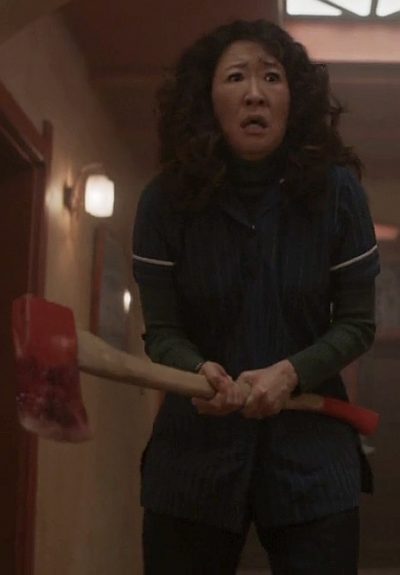 [Warning: this piece will contain significant spoilers for the show. READ ON AT YOUR OWN RISK!] It was always going to be difficult, if not impossible, for the second series of Killing Eve to match the brilliance of the first. That had ended with mousy MI-5 desk jockey Eve (Oh) stabbing ruthless assassin Villanelle (Connor), as they lay on a bed – platonically, but you could cut the sexual tension with a knife. Where would things go from there? The answer, unfortunately, is nowhere particularly much, except for some thoroughly unconvincing plot twists, such as Villanelle going to work for MI-5. Hello? Did everyone forget her cold-blooded murders of agents Bill Pargrave and Frank Haleton in season one? Let’s just pretend she’s one of us, and send her off on a mission without so much as a background check, m’kay?
[Warning: this piece will contain significant spoilers for the show. READ ON AT YOUR OWN RISK!] It was always going to be difficult, if not impossible, for the second series of Killing Eve to match the brilliance of the first. That had ended with mousy MI-5 desk jockey Eve (Oh) stabbing ruthless assassin Villanelle (Connor), as they lay on a bed – platonically, but you could cut the sexual tension with a knife. Where would things go from there? The answer, unfortunately, is nowhere particularly much, except for some thoroughly unconvincing plot twists, such as Villanelle going to work for MI-5. Hello? Did everyone forget her cold-blooded murders of agents Bill Pargrave and Frank Haleton in season one? Let’s just pretend she’s one of us, and send her off on a mission without so much as a background check, m’kay?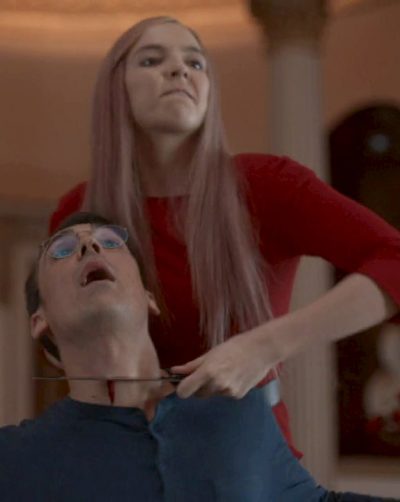 After becoming an under-the-radar hit the first time, the second set of episodes seems to have left a lot of people unsatisfied, for a variety of reason. And the ratings reflect this. Having managed the almost unprecedented feat of increasing almost every week the first time round, this season saw fewer viewers for every part after the debut, than the equivalent in series one. Maybe renewing it the day after that opening episode was a mistake? The final scene of this series ends in a mirror image of its predecessor, Villanelle shooting Eve in a fit of pique after she responds to Villanelle’s declaration of love with “You don’t know what that is,” and walks away. Of course, the renewal and critical acclaim basically make it certain Eve isn’t dead. So it’s less a case of “What will happen?”, than “What cheat will the writers use to get out of the corner into which they’ve painted themselves?” I’m going with a bullet-proof vest.
After becoming an under-the-radar hit the first time, the second set of episodes seems to have left a lot of people unsatisfied, for a variety of reason. And the ratings reflect this. Having managed the almost unprecedented feat of increasing almost every week the first time round, this season saw fewer viewers for every part after the debut, than the equivalent in series one. Maybe renewing it the day after that opening episode was a mistake? The final scene of this series ends in a mirror image of its predecessor, Villanelle shooting Eve in a fit of pique after she responds to Villanelle’s declaration of love with “You don’t know what that is,” and walks away. Of course, the renewal and critical acclaim basically make it certain Eve isn’t dead. So it’s less a case of “What will happen?”, than “What cheat will the writers use to get out of the corner into which they’ve painted themselves?” I’m going with a bullet-proof vest.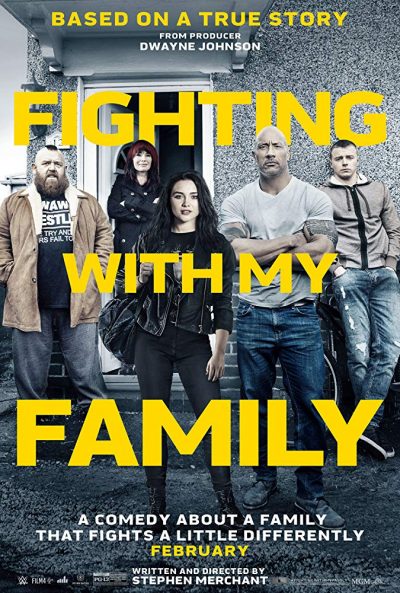 This biopic of WWE Women’s Champion Paige, a.k.a. Saraya Knight from the English seaside town of Norwich, gets a lot of things right about professional wrestling. In particular, it strikes a good balance between the various aspects – positive and negative – of the sports entertainment business. Over the past twenty years, Chris and I have been intermittently involved with the independent end of the wrestling scene, like Knight and her family, and this captures the low-rent showbiz aspects beautifully. Yet it doesn’t shortchange the seductive – almost addictive – appeal of performance for a responsive crowd, or the potential escape from a drab life it offers someone like Saraya/Paige.
This biopic of WWE Women’s Champion Paige, a.k.a. Saraya Knight from the English seaside town of Norwich, gets a lot of things right about professional wrestling. In particular, it strikes a good balance between the various aspects – positive and negative – of the sports entertainment business. Over the past twenty years, Chris and I have been intermittently involved with the independent end of the wrestling scene, like Knight and her family, and this captures the low-rent showbiz aspects beautifully. Yet it doesn’t shortchange the seductive – almost addictive – appeal of performance for a responsive crowd, or the potential escape from a drab life it offers someone like Saraya/Paige. I was quite surprised to hear about Amazon taking up Joe Wright’s 2011
I was quite surprised to hear about Amazon taking up Joe Wright’s 2011 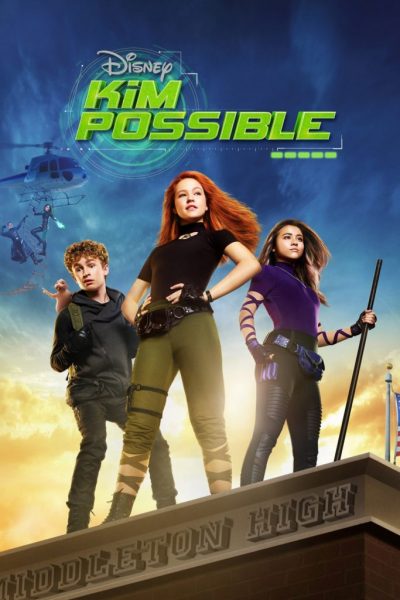 The new trend for Disney appears to be, live-action version of their beloved classic movies. This year alone, we can expect to see Dumbo, Aladdin and The Lion King, with Mulan to follow in 2020. A possible stalking horse for this was the live-action version of (somewhat) beloved TV series, Kim Possible, which ran for four seasons from 2002-07. It was pretty good, likely peaking with TV movie
The new trend for Disney appears to be, live-action version of their beloved classic movies. This year alone, we can expect to see Dumbo, Aladdin and The Lion King, with Mulan to follow in 2020. A possible stalking horse for this was the live-action version of (somewhat) beloved TV series, Kim Possible, which ran for four seasons from 2002-07. It was pretty good, likely peaking with TV movie 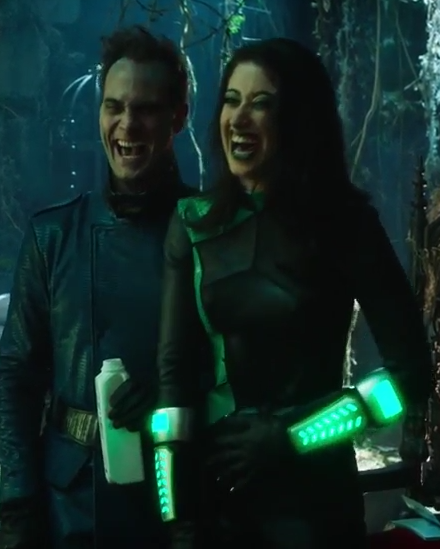 Instead, however, there’s a really horrible plot about Kim befriending Athena (Wilson), another new student. I’m sorry, when did Kim Possible become a relationship drama? Jealousy of Athena – despite her being super-annoying – causes Kim to suffer self-doubt, and fail when she is needed most… blah blah blah. Awful scripting, the portrayal of their relationship is sub-juvenile pap, which I’m sure would turn the stomach of any actual high-schooler. Worse, it goes beyond “flawed”, making the heroine weak and no longer heroic. And what’s with Kim being obsessed with joining the school’s soccer team? She was a
Instead, however, there’s a really horrible plot about Kim befriending Athena (Wilson), another new student. I’m sorry, when did Kim Possible become a relationship drama? Jealousy of Athena – despite her being super-annoying – causes Kim to suffer self-doubt, and fail when she is needed most… blah blah blah. Awful scripting, the portrayal of their relationship is sub-juvenile pap, which I’m sure would turn the stomach of any actual high-schooler. Worse, it goes beyond “flawed”, making the heroine weak and no longer heroic. And what’s with Kim being obsessed with joining the school’s soccer team? She was a  ★★★★
★★★★ Depending on your definition, this is perhaps the most expensive action-heroine film of all time, estimated at more than $200 million before tax incentives. Given the fate of live-action adaptations of manga in the West, most recently
Depending on your definition, this is perhaps the most expensive action-heroine film of all time, estimated at more than $200 million before tax incentives. Given the fate of live-action adaptations of manga in the West, most recently  That’s a shame, because this is a solid, well-made piece of science-fiction, which does a particularly good job of creating a massive, epic world on the cinema screen. Rodriguez has been squeezing every penny out of his budgets since El Mariachi, and while there may not be much apparent overlap between Alita with Shark Boy and Lava Girl, the latter franchise was excellent training for RR in meshing computer graphics with actors. Sin City also laid similar groundwork, and helped set up the director with the chance to go big or go home. And there’s no doubt: Rodriguez went big. This was my first cinema trip of 2019, and was fully justified.
That’s a shame, because this is a solid, well-made piece of science-fiction, which does a particularly good job of creating a massive, epic world on the cinema screen. Rodriguez has been squeezing every penny out of his budgets since El Mariachi, and while there may not be much apparent overlap between Alita with Shark Boy and Lava Girl, the latter franchise was excellent training for RR in meshing computer graphics with actors. Sin City also laid similar groundwork, and helped set up the director with the chance to go big or go home. And there’s no doubt: Rodriguez went big. This was my first cinema trip of 2019, and was fully justified. And speaking of the end, one frequently-heard bit of criticism is that the ending is too “open,” apparently fishing for a sequel. I can’t say I felt that way at all. There’s certainly scope for more movies, apparently involving Alita going after the mysterious Nova. Yet the main thread of the film, involving Alita and Hugo, is definitively wrapped up. In comparison, say, to Marvel films, which almost inevitably have an in- or post-credit sequence blatantly signposting the next film, this felt conclusive. While there is perhaps need for a greater sense of escalation, or a bigger climax (that Motorball battle is trivial in its consequences), I’m largely baffled by complaints about the “lack of a genuine ending.”
And speaking of the end, one frequently-heard bit of criticism is that the ending is too “open,” apparently fishing for a sequel. I can’t say I felt that way at all. There’s certainly scope for more movies, apparently involving Alita going after the mysterious Nova. Yet the main thread of the film, involving Alita and Hugo, is definitively wrapped up. In comparison, say, to Marvel films, which almost inevitably have an in- or post-credit sequence blatantly signposting the next film, this felt conclusive. While there is perhaps need for a greater sense of escalation, or a bigger climax (that Motorball battle is trivial in its consequences), I’m largely baffled by complaints about the “lack of a genuine ending.” Definitely a mixed bag in this independent work about an assassin on the run from her employers after she botches a contract. Seay is thoroughly compelling as Set, proving that less can sometimes be more when it comes to dialogue. She’s a woman of few words, yet the strength of her emotions still comes through in her performance. I think it’s the eyes. Unfortunately, the makers appear not to have had enough confidence to let her silence stand on its own. Instead, they fill the gap with the inane burblings of Samuel (Laballe), a young man who sees Seay, and decides she’s a battered woman in need of rescue. He quickly discovers that isn’t the case, as she ends up rescuing him from one of the killers sent on her trail. However, his sister Dana (Cné) is unimpressed with her brother’s new friend, and turns Set in to her boss, Karlton (Brown).
Definitely a mixed bag in this independent work about an assassin on the run from her employers after she botches a contract. Seay is thoroughly compelling as Set, proving that less can sometimes be more when it comes to dialogue. She’s a woman of few words, yet the strength of her emotions still comes through in her performance. I think it’s the eyes. Unfortunately, the makers appear not to have had enough confidence to let her silence stand on its own. Instead, they fill the gap with the inane burblings of Samuel (Laballe), a young man who sees Seay, and decides she’s a battered woman in need of rescue. He quickly discovers that isn’t the case, as she ends up rescuing him from one of the killers sent on her trail. However, his sister Dana (Cné) is unimpressed with her brother’s new friend, and turns Set in to her boss, Karlton (Brown).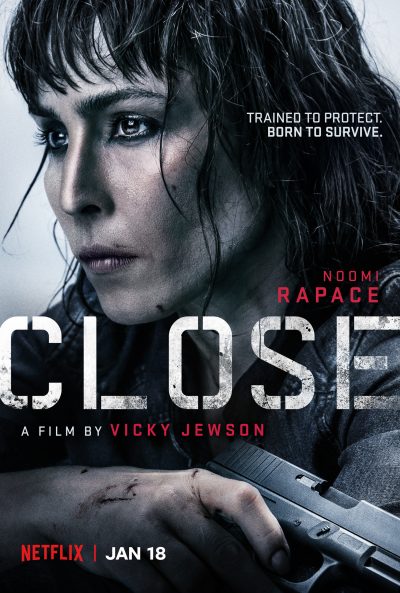 Rapace appears to be aiming for a niche in the straight-to-video (or, at least, straight to Netflix) action market, this coming on the heels of
Rapace appears to be aiming for a niche in the straight-to-video (or, at least, straight to Netflix) action market, this coming on the heels of